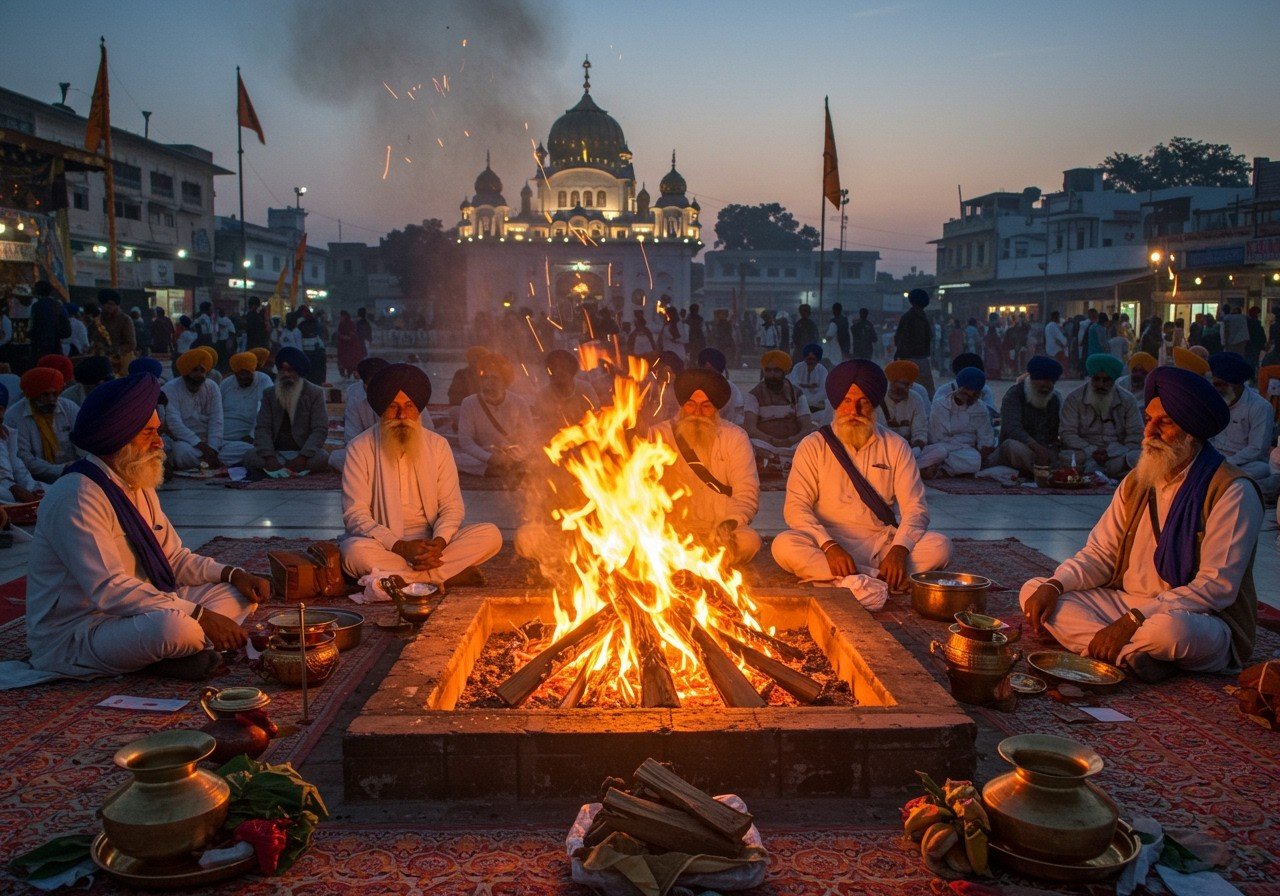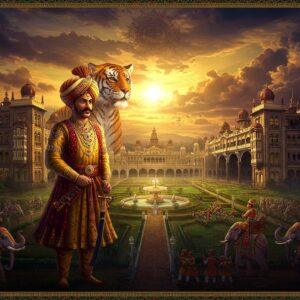
Embark on a journey to discover the profound significance of Dhuni in Punjabi culture and traditions. This sacred practice, deeply rooted in history, connects generations and offers spiritual solace. Explore how Dhuni continues to hold a special place in modern times, bridging the past with the present.
Understanding Dhuni in Punjabi Culture
Dhuni is a time-honored tradition with deep meaning in Punjabi culture. The term “Dhuni” itself comes from Punjabi, symbolizing a sacred fire used in spiritual gatherings. It represents warmth, unity, and a connection to the divine. Dhuni acts as a communal gathering point, fostering a sense of shared identity among Punjabis. Traditionally, specific woods and herbs, each with its own symbolic meaning, are used to create a Dhuni, imbuing the practice with layers of cultural and spiritual significance.
Key Elements of Dhuni:
- Materials: Woods like sandalwood and herbs such as camphor are commonly used, their fragrance adding to the spiritual atmosphere.
- Occasions: Dhuni features prominently during festivals like Lohri and Maghi, adding a sacred dimension to the celebrations. Lohri, celebrated in January, marks the end of winter, while Maghi, also in January, is a Sikh festival commemorating the martyrdom of forty Sikh warriors.
- Sikhism Influence: Dhuni is often associated with spiritual leaders and their teachings, reflecting its importance in Sikhism.
Through its practices, Dhuni serves not only as a cultural tradition but also as a spiritual beacon, guiding individuals towards inner peace and community bonding.
Rituals and Practices Surrounding Dhuni
Dhuni holds a sacred place in Punjabi culture, not just as a fire, but as a spiritual practice. Picture the soft glow of the flames, surrounded by families and communities united in prayer and reflection. Lighting a Dhuni is a ritual filled with reverence, connecting individuals to something larger than themselves.
Preparation and Lighting
Creating a Dhuni involves selecting special woods like sandalwood and herbs such as guggal. These materials are believed to carry spiritual significance, their fragrance purifying the air. Preparing them with care is an act of devotion, a way of honoring the tradition. Once lit, the Dhuni becomes the heart of the gathering, drawing everyone into its warm embrace.
Spiritual Practices
During Dhuni, various spiritual activities take place. People often chant hymns and engage in quiet meditation, finding solace in the shared experience. The practice creates a moment of pause, helping individuals connect with the divine and find inner peace. Offerings, such as ghee and grains, are made into the Dhuni. Each item carries symbolic meaning, representing purity, abundance, and gratitude.
Purification Rituals
Dhuni is also seen as a powerful tool for purification. It is believed to cleanse both the mind and soul, washing away negative energies and promoting a sense of renewal. This cleansing effect creates an environment of positivity, fostering healing and peace within the community.
Healing Practices
In many communities, Dhuni is believed to ward off negative forces. People gather around it, seeking protection and well-being for themselves and their loved ones. The smoke, infused with aromatic herbs, fills the air, believed to carry healing properties that promote physical and spiritual health.
Guidelines and Etiquette
Respect is paramount during Dhuni rituals. Participants observe specific guidelines to honor the tradition, showing reverence for the fire and the practices surrounding it. This reflects a deep respect for cultural heritage, passed down through generations.
Dhuni Bodh in Punjabi Tradition
Dhuni Bodh is more than a practice; it’s a path to spiritual wisdom. This concept embodies the enlightenment gained through Dhuni, guiding individuals on their spiritual journey and offering insights into life’s deeper mysteries.
Teachings and Philosophies
Dhuni Bodh often involves teachings from spiritual leaders. During communal gatherings, these leaders share their wisdom, helping others find self-realization and inner peace. These moments are treasured, providing guidance and clarity on life’s journey.
Personal Growth and Transformation
The impact of Dhuni Bodh on personal growth can be profound. It encourages introspection and self-awareness, leading to transformative experiences. Individuals may discover deeper meanings and connections within themselves, fostering a sense of purpose and fulfillment.
Contemporary Relevance of Dhuni
Even today, Dhuni holds a significant place in Punjabi culture. Younger generations are showing renewed interest in this ancient tradition, finding relevance in its timeless wisdom. It adapts to modern lifestyles while preserving its core essence.
Virtual Gatherings
In our fast-paced world, virtual Dhuni gatherings have gained popularity. Technology enables people to connect and participate from anywhere, preserving this cherished tradition even across geographical boundaries. This allows families and communities to stay connected to their roots, regardless of where they live.
Mental Well-being
Dhuni offers benefits for mental well-being. The practice can provide stress relief and foster a sense of calmness in today’s hectic world. It encourages mindfulness, allowing individuals to focus on the present moment and find a sense of inner peace.
Cultural Identity
For diaspora communities, Dhuni serves as a powerful reminder of their cultural roots. It fosters pride and unity, bridging generations across distances and strengthening ties to their heritage.
Commercial Aspects
With the rise of online shopping, the demand for Dhuni kits has increased. These kits provide convenient access to the necessary materials, making it easier for individuals to participate in the tradition and ensuring its continued relevance in modern times.
How Poojn.in Helps You Celebrate Dhuni Traditions
Poojn.in offers authentic Dhuno (ਧੁਨੋ) and related items for your sacred Punjabi rituals. We understand the importance of Dhuni in creating a pure, spiritual atmosphere during your ceremonies.
What We Offer:
- Premium quality Dhuno (Indian Frankincense)
- Traditional brass dhuni holders
- Complete Dhuni ritual kits
- Pure cotton wicks
- Authentic camphor
- Sacred woods for Dhuni
Why Choose Poojn.in:
- Guaranteed authentic products sourced with utmost care
- Direct delivery to your doorstep for your convenience
- Bulk orders available for temples and institutions
- Expert guidance on product selection to ensure you have everything you need
- Secure packaging to maintain the purity of your items
- Pan-India shipping
Contact us for all your Dhuni ritual needs:
- Phone: 03369029784
- WhatsApp: 9476142738
- Website: www.poojn.in
Our team is ready to assist you in selecting the perfect items for your sacred ceremonies. We guarantee you’ll receive genuine, high-quality products that uphold the sanctity of your religious practices.
Shop Now at Poojn.in – India’s Biggest Dashakarma Bhandar
Embracing Dhuni: A Timeless Tradition
Dhuni, with its gentle flames and fragrant smoke, stands as a beacon of spirituality in Punjabi culture. It’s more than just a ritual; it’s a gathering of hearts and souls, a bridge between generations past and present. As we embrace the warmth and wisdom of Dhuni, we honor our ancestors and cherish the values they passed down. In today’s world, where connections can feel fleeting, Dhuni offers a moment of genuine togetherness and reflection.
Whether through traditional gatherings or modern virtual meetups, Dhuni continues to guide us with its light. It teaches us to pause, reflect, and find peace within ourselves. For those seeking to keep this tradition alive, the convenience of online shopping offers an easy way to bring the sacred practice of Dhuni into our homes. As we light the Dhuni, we connect not only with our heritage but also with each other, fostering a sense of unity and belonging that transcends time and distance.
FAQs on Dhuni in Punjabi Culture and Traditions
What is Dhuni in Punjabi? Dhuni in Punjabi refers to a sacred fire, continuously kept burning, often at the center of spiritual and religious rituals. It symbolizes warmth, light, and the divine presence.
How is Dhuni significant in Punjabi traditions? Dhuni is deeply significant in Punjabi traditions. It represents purity, spiritual energy, and a connection to divine forces. It plays a crucial role in many rituals and ceremonies, creating a sacred atmosphere.
What rituals involve Dhuni in Punjabi culture? Dhuni is integral to rituals like havan (fire ceremony) and puja (worship), where offerings are made to the fire to seek blessings, express gratitude, and cleanse negative energies. The specific rituals and their significance can vary based on the occasion and community.
Why do people in Punjabi culture practice Dhuni Bodh? Dhuni Bodh involves meditation and spiritual practices performed around the Dhuni. It is believed to enhance focus, inner peace, and spiritual strength, enabling individuals to connect with their inner selves and the divine.
How is Dhuni maintained during rituals? The Dhuni is kept burning by regularly adding wood, often sandalwood, or ghee (clarified butter), ensuring the fire remains alive throughout the ritual. This act of maintaining the fire is itself considered a sacred duty.
Can Dhuni be performed at home? Yes, Dhuni can be performed at home. However, it requires proper guidance to maintain its sanctity and follow traditional procedures respectfully. Consulting with knowledgeable individuals or spiritual leaders is often recommended.
What materials are used in Dhuni rituals? Materials such as sandalwood, ghee, specific herbs, and incense are commonly used in Dhuni. These items are chosen for their purifying properties and ability to invoke spiritual energies, creating a sacred and uplifting atmosphere.
Is Dhuni only practiced in religious settings? While Dhuni is prevalent in religious settings like temples and gurudwaras, it’s also practiced in homes for personal spiritual growth, to promote positivity, and during family celebrations. The practice adapts to different contexts while retaining its core significance.


